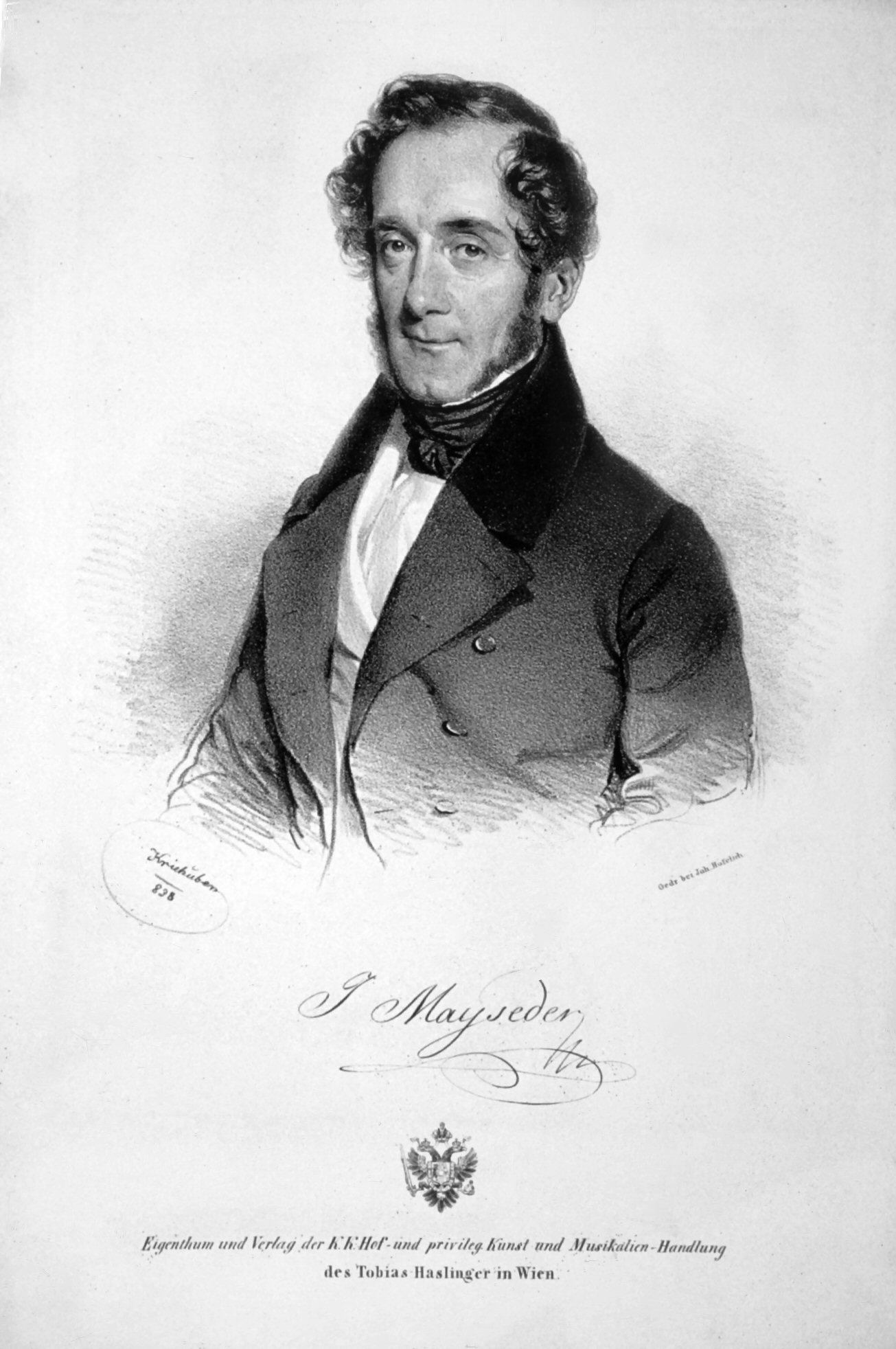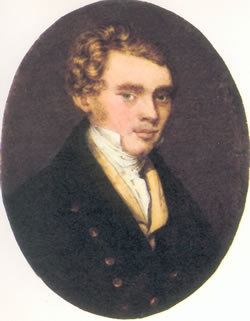Schuppanzigh Quartet on:
[Wikipedia]
[Google]
[Amazon]
The Schuppanzigh Quartet was a
 Ignaz Schuppanzigh assembled an informal string quartet for
Ignaz Schuppanzigh assembled an informal string quartet for
Elias String Quartet: the Beethoven Project. Retrieved 6 April 2019. In December 1808,
 On New Year's Eve 1815, Razumovsky's palace burnt down, and Schuppanzigh's quartet was disbanded. Schuppanzigh left Vienna, and for several years was based in St. Petersburg while making concert tours of
On New Year's Eve 1815, Razumovsky's palace burnt down, and Schuppanzigh's quartet was disbanded. Schuppanzigh left Vienna, and for several years was based in St. Petersburg while making concert tours of
La Scena Musicale, Vol. 16 No. 8. Retrieved 6 April 2019. In 1824, Beethoven, who had not written a string quartet since his Op. 95 in 1810, composed his String Quartet Op. 127, to a commission by Russian aristocrat Nikolay Borisovich Galitzin. The following year Schuppanzigh's quartet gave the first performance of this work; Beethoven was not pleased with the performance, for which he blamed Schuppanzigh, but the quartet later performed the two other string quartets commissioned by Galitzin: String Quartet Op. 130 and String Quartet Op. 132. They also gave the first performance of
'' The Cambridge Companion to the String Quartet'', edited by Robin Stowell. Cambridge University Press, 2003.Paul Nettl. "String Quartets" and "Galitzin, Prince Nikolaus Boris" in ''Beethoven Encyclopedia''. Philosophical Library, New York, 1956.
string quartet
The term string quartet can refer to either a type of musical composition or a group of four people who play them. Many composers from the mid-18th century onwards wrote string quartets. The associated musical ensemble consists of two violinists ...
formed in Vienna
en, Viennese
, iso_code = AT-9
, registration_plate = W
, postal_code_type = Postal code
, postal_code =
, timezone = CET
, utc_offset = +1
, timezone_DST ...
in the 1790s by the violinist
The following lists of violinists are available:
* List of classical violinists, notable violinists from the baroque era onwards
* List of contemporary classical violinists, notable contemporary classical violinists
* List of violinist/composers, ...
Ignaz Schuppanzigh
Ignaz Schuppanzigh (20 July Michael Lorenz"Four more months for Ignaz Schuppanzigh" 13 August 2012] 1776 – 2 March 1830) was an Austrian violinist, friend and teacher of Ludwig van Beethoven, Beethoven, and leader of Count Razumovsky's private ...
. It continued, with breaks and changes of members, for many years. Schuppanzigh was a close friend and admirer of Ludwig van Beethoven
Ludwig van Beethoven (baptised 17 December 177026 March 1827) was a German composer and pianist. Beethoven remains one of the most admired composers in the history of Western music; his works rank amongst the most performed of the classical ...
, and the quartet gave the first performances of many of Beethoven's string quartets
The term string quartet can refer to either a type of musical composition or a group of four people who play them. Many composers from the mid-18th century onwards wrote string quartets. The associated musical ensemble consists of two violinists ...
.
Origins
 Ignaz Schuppanzigh assembled an informal string quartet for
Ignaz Schuppanzigh assembled an informal string quartet for Prince Lichnowsky
The House of Lichnowsky or House of Lichnovský is the name of an influential Czech aristocratic family of Silesian and Moravian origin, documented since the 14th century.
History
The noble family first appeared in the Duchy of Pless (Pszczyna) ...
in 1795. Its membership varied; the more regular players, all aged under 20, were Louis Sina playing second violin, Franz Weiss playing viola
The viola ( , also , ) is a string instrument that is bow (music), bowed, plucked, or played with varying techniques. Slightly larger than a violin, it has a lower and deeper sound. Since the 18th century, it has been the middle or alto voice of ...
and Nikolaus Kraft
Nikolaus Kraft (14 December 1778, Eszterháza, Hungary – 18 May 1853, Cheb, Bohemia) was an Austrian cellist and composer (six cello concertos). He was the son of Antonín Kraft image:AntonKraft.jpg, Antonín Kraft
Antonín Kraft (30 December ...
playing cello
The cello ( ; plural ''celli'' or ''cellos'') or violoncello ( ; ) is a Bow (music), bowed (sometimes pizzicato, plucked and occasionally col legno, hit) string instrument of the violin family. Its four strings are usually intonation (music), t ...
. Beethoven's first set of string quartets, Op. 18, which were completed in 1800, were first performed by Schuppanzigh's quartet.
In 1805 Schuppanzigh formed his own quartet; the other players were Joseph Mayseder
Joseph Mayseder (27 October 1789 – 21 November 1863) was an Austrian violin virtuoso and composer.
Biography
Mayseder showed musical promise from an early age, and was a student of Joseph Suche (1797), Paul Wranitzky (1798) and Ignaz Schuppanz ...
(second violin), Anton Schreiber (viola) and Antonín Kraft image:AntonKraft.jpg, Antonín Kraft
Antonín Kraft (30 December 1749, Rokycany – 28 August 1820, Vienna) was a Czech people, Czech cello, cellist and composer. He was a close friend of Joseph Haydn, Haydn, Wolfgang Amadeus Mozart, Mozart, and Lu ...
, the father of Nikolaus Kraft (cello). Their first concerts took place in ''Heiligenkreutzerhof'', a private house; later in the restaurant ''Römischer Kaiser''.
Count Razumovsky's quartet
In 1808, CountAndrey Razumovsky
Count (later Prince) Andrey Kirillovich Razumovskyrussian: Андре́й Кири́ллович Разумо́вский, , german: Andreas von Rasumofsky (2 November 1752 – 23 September 1836) was a Russian Imperial diplomat who spent man ...
, who was an amateur musician and enjoyed gathering musicians in his palace to play chamber music, commissioned Schuppanzigh to assemble a new string quartet. This was a permanent arrangement, the members being given lifelong contracts. Louis Sina played second violin, Franz Weiss played viola and Joseph Linke Joseph Linke (also spelled Joseph Lincke, Josef Linke; 8 June 1783 – 26 March 1837) was a cellist and composer who had a distinguished career in Vienna, as a soloist and as a member of the Schuppanzigh Quartet. He took part in the first performan ...
played cello."The early performers of the quartets of Beethoven"Elias String Quartet: the Beethoven Project. Retrieved 6 April 2019. In December 1808,
Johann Friedrich Reichardt
Johann Friedrich Reichardt (25 November 1752 – 27 June 1814) was a German composer, writer and music critic.
Early life
Reichardt was born in Königsberg, East Prussia, to lutenist and ''Stadtmusiker'' Johann Reichardt (1720–1780). Johann Fr ...
, a composer and writer on music, attended one of Razumovsky's concerts. He wrote:
This quartet was on the whole very well put together... Herr Schuppanzigh has an individual piquant way of playing which is very suitable to the humorous quartets of Haydn, Mozart and Beethoven... He executes with clarity, though not always absolutely cleanly, the difficult passages, which the local virtuosi seem to avoid altogether. He also accents very correctly and significantly. His ''cantabile'' is often truly singing and moving. He also leads his well-picked colleagues skilfully and truly in the spirit of the composer.
Later years
 On New Year's Eve 1815, Razumovsky's palace burnt down, and Schuppanzigh's quartet was disbanded. Schuppanzigh left Vienna, and for several years was based in St. Petersburg while making concert tours of
On New Year's Eve 1815, Razumovsky's palace burnt down, and Schuppanzigh's quartet was disbanded. Schuppanzigh left Vienna, and for several years was based in St. Petersburg while making concert tours of Poland
Poland, officially the Republic of Poland, is a country in Central Europe. It is divided into 16 administrative provinces called voivodeships, covering an area of . Poland has a population of over 38 million and is the fifth-most populous ...
and Prussia
Prussia, , Old Prussian: ''Prūsa'' or ''Prūsija'' was a German state on the southeast coast of the Baltic Sea. It formed the German Empire under Prussian rule when it united the German states in 1871. It was ''de facto'' dissolved by an em ...
. He returned in 1823 and reformed his string quartet; Karl Holz played second violin, and the other members were as before. They gave concerts which were open to the public on subscription; it was unusual during this period to give concerts of music for string quartet."Classical revolutionaries: Beethoven, The Schuppanzigh Quartet and the new musical culture", by Pemi PaullLa Scena Musicale, Vol. 16 No. 8. Retrieved 6 April 2019. In 1824, Beethoven, who had not written a string quartet since his Op. 95 in 1810, composed his String Quartet Op. 127, to a commission by Russian aristocrat Nikolay Borisovich Galitzin. The following year Schuppanzigh's quartet gave the first performance of this work; Beethoven was not pleased with the performance, for which he blamed Schuppanzigh, but the quartet later performed the two other string quartets commissioned by Galitzin: String Quartet Op. 130 and String Quartet Op. 132. They also gave the first performance of
Schubert
Franz Peter Schubert (; 31 January 179719 November 1828) was an Austrian composer of the late Classical and early Romantic eras. Despite his short lifetime, Schubert left behind a vast ''oeuvre'', including more than 600 secular vocal wor ...
's A minor Quartet (D. 804)"From chamber to concert hall", by Tully Potter'' The Cambridge Companion to the String Quartet'', edited by Robin Stowell. Cambridge University Press, 2003.Paul Nettl. "String Quartets" and "Galitzin, Prince Nikolaus Boris" in ''Beethoven Encyclopedia''. Philosophical Library, New York, 1956.
After Schuppanzigh
After Schuppanzigh's death in 1830, the violinist and composerLeopold Jansa
Leopold Jansa (23 March 1795, Wildenschwert ( cs, Ústí nad Orlicí), far north-east Bohemia, Austrian Empire – 25 January 1875, Vienna) was a Bohemian violinist, composer, and teacher.
He was born in Wildenschwert, Austria-Hungary (present d ...
formed a string quartet: it included Karl Holz and Joseph Linke. It performed, with breaks and changes to its membership, until 1849, when Jansa moved to London; the quartet was then led by Joseph Hellmesberger and was called the Hellmesberger Quartet
The Hellmesberger Quartet was a string quartet formed in Vienna in 1849. It was founded by Joseph Hellmesberger Sr. and was the first permanent named String Quartet.
Composition
Violinist Leopold Jansa had started a string quartet in 1845. Hellme ...
. Joseph Mayseder, a member of Schuppanzigh's quartet in its early years, formed his own quartet in 1817, which performed until 1860.
References
{{authority control Austrian string quartets Ludwig van Beethoven